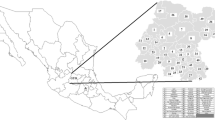Abstract
Co-firing of biomass in coal-fired power plants is considered one of the most economic ways of carbon dioxide abatement. We investigate the deployment and relocation of several semi-mobile processing facilities in order to supply a large coal-fired power plant with high-quality renewable energy carriers. Semi-mobile facilities are characterized by a containerized design and can be relocated in case of changes in supply and demand. The energy carriers which are produced by different types of semi-mobile technologies are bulky goods with high density and properties comparable to those of coal and fuel oil. Thus, intermodal transportation is required to achieve transportation costs which are competitive with the delivered cost of fossil fuels at the plant’s gate. The optimization of the investigated supply chain therefore requires simultaneous planning of semi-mobile facility deployment and intermodal transportation. To this end, we present a mixed-integer linear problem which optimizes the number of semi-mobile facilities, their respective relocation over time and the intermodal transportation of produced energy carriers to the power plant. In the presented case, train transportation is characterized by a low geographical coverage of the railway network and restrictions representing minimum shipping volumes per railway line. The model minimizes the objective function of total supply chain costs including electricity generation, transportation, the operation and relocation of the semi-mobile plants and the necessary forestry operations associated with the deployed facilities. The model is implemented in GAMS and solved using the CPLEX solver. We discuss a numerical example based on data from the forestry and energy sector in Chile.
Access this chapter
Tax calculation will be finalised at checkout
Purchases are for personal use only
Similar content being viewed by others
References
Brown, D., Rowe, A., Wild, P.: A techno-economic analysis of using mobile distributed pyrolysis facilities to deliver a forest residue resource. Bioresour. Technol. 150, 367–376 (2013)
Mirkouei, A., Mirzaie, P., Haapala, K.R., Sessions, J., Murthy, G.S.: Reducing the cost and environmental impact of integrated fixed and mobile bio-oil refinery supply chains. J. Clean. Prod. 113, 495–507 (2016)
Pérez-Fortes, M., Laínez-Aguirre, J.M., Bojarski, A.D., Puigjaner, L.: Optimization of pre-treatment selection for the use of woody waste in co-combustion plants. Chem. Eng. Res. Des. 8, 1539–1562 (2014)
Roni, Md.S., Eksioglu, S.D., Searcy, E., Jha, K.: A supply chain network design model for biomass co-firing in coal-fired power plants. Transp. Res. Part E: Logist. Transp. Rev. 61, 115–134 (2014)
Sharifzadeh, M., Garcia, M.C., Shah, N.: Systematic decision-making for centralized, distributed, and mobile biofuel production using mixed integer linear programming (MILP) under uncertainty. Biomass Bioenergy 81, 401–414 (2015)
Author information
Authors and Affiliations
Corresponding author
Editor information
Editors and Affiliations
Rights and permissions
Copyright information
© 2018 Springer International Publishing AG
About this paper
Cite this paper
Zimmer, T., Breun, P., Schultmann, F. (2018). Deployment and Relocation of Semi-mobile Facilities in a Thermal Power Plant Supply Chain. In: Fink, A., Fügenschuh, A., Geiger, M. (eds) Operations Research Proceedings 2016. Operations Research Proceedings. Springer, Cham. https://doi.org/10.1007/978-3-319-55702-1_26
Download citation
DOI: https://doi.org/10.1007/978-3-319-55702-1_26
Published:
Publisher Name: Springer, Cham
Print ISBN: 978-3-319-55701-4
Online ISBN: 978-3-319-55702-1
eBook Packages: Business and ManagementBusiness and Management (R0)




